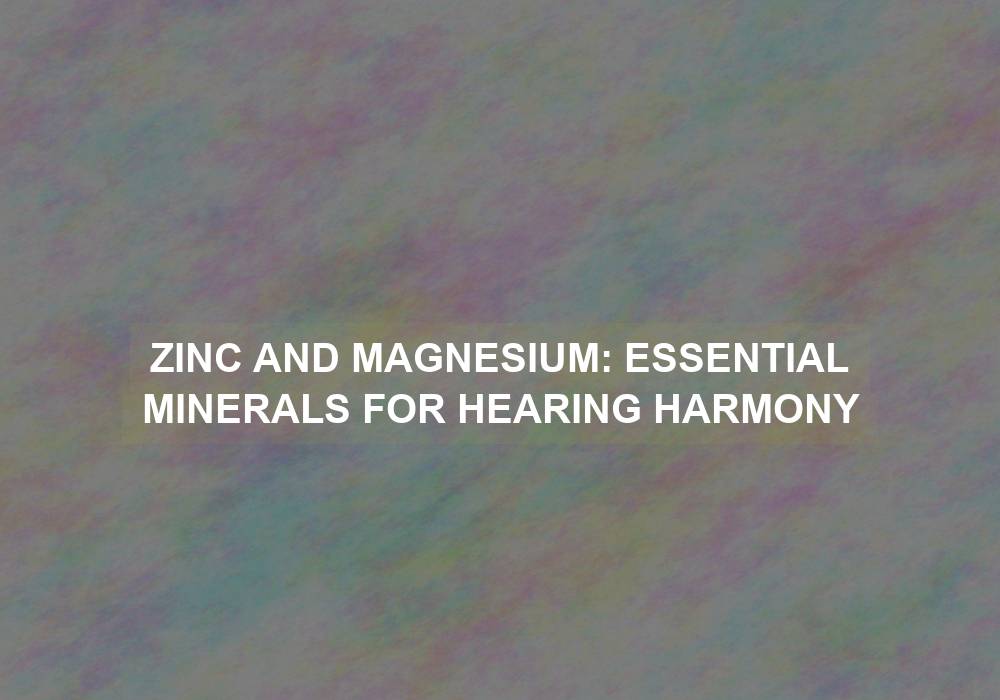Maintaining good hearing health is crucial for our overall well-being. Our ears are constantly exposed to various sounds and noises, and it is essential to take care of them to prevent any potential hearing problems. One way to support and improve our hearing is by ensuring we have an adequate intake of essential minerals, such as zinc and magnesium. In this article, we will explore the importance of zinc and magnesium for hearing health and how to incorporate them into our daily diet.
The Role of Zinc in Hearing Health
Zinc is an essential mineral that plays a vital role in various bodily functions, including supporting our sense of hearing. It is a key component of many enzymes and proteins involved in maintaining the health of our auditory system.
Zinc and Age-Related Hearing Loss
As we age, our hearing abilities naturally decline, and age-related hearing loss becomes more common. However, research suggests that zinc supplementation may help slow down this process and reduce the risk of age-related hearing loss. Zinc contributes to the maintenance and repair of the delicate structures in the inner ear, which are responsible for transmitting sound signals to the brain.
Zinc deficiency has been linked to age-related hearing loss, and supplementing with zinc has shown promising results in reducing the risk of this condition. By including zinc-rich foods in our diet, we can ensure an adequate intake of this essential mineral. Some excellent sources of zinc include shellfish (such as oysters, crab, and lobster), red meat (beef and lamb), poultry (chicken and turkey), legumes (chickpeas, lentils, and beans), nuts and seeds (pumpkin seeds, cashews, and almonds), whole grains, and dairy products (milk, cheese, and yogurt).
Zinc and Tinnitus
Tinnitus, commonly known as ringing in the ears, can be a distressing condition that affects many individuals. While the exact causes of tinnitus can vary, studies have shown that zinc deficiency may contribute to its development. Supplementing with zinc has been found to alleviate tinnitus symptoms in some individuals, highlighting the potential benefits of this mineral for managing this condition.
In addition to supplementation, incorporating zinc-rich foods into our diet can also support our hearing health. Foods such as shellfish, red meat, poultry, legumes, nuts and seeds, whole grains, and dairy products are all excellent sources of zinc that can help maintain optimal zinc levels.
The Importance of Magnesium for Hearing
Alongside zinc, magnesium is another essential mineral that plays a crucial role in maintaining our hearing health. It is involved in various processes within our auditory system, contributing to the overall functioning of our ears.
Magnesium Deficiency and Hearing Loss
Research suggests that magnesium deficiency may be linked to an increased risk of hearing loss, particularly noise-induced hearing loss. Exposure to loud noises can cause damage to the delicate hair cells in our inner ear, leading to hearing problems. Magnesium acts as a protective agent, helping to prevent this damage and preserving our hearing abilities.
To ensure an adequate intake of magnesium, it is important to include magnesium-rich foods in our diet. Leafy green vegetables such as spinach, kale, and Swiss chard, nuts and seeds like almonds, cashews, and sunflower seeds, whole grains such as brown rice, quinoa, and oats, legumes including black beans, lentils, and chickpeas, avocado, dark chocolate, and bananas are all excellent dietary sources of magnesium.
Magnesium and Noise-Induced Hearing Loss
In addition to its protective effects, magnesium has also been found to potentially aid in the recovery of noise-induced hearing loss. Studies have shown that magnesium supplementation, when administered shortly after exposure to loud noises, can reduce the severity of hearing loss and promote faster recovery.
Including magnesium-rich foods in our diet can support our hearing health and help prevent noise-induced hearing loss. Leafy green vegetables, nuts and seeds, whole grains, legumes, avocado, dark chocolate, and bananas are all delicious and nutritious sources of magnesium.
Conclusion
Zinc and magnesium are two essential minerals that play significant roles in maintaining optimal hearing health. Zinc supports the maintenance and repair of the auditory system, helping to prevent age-related hearing loss and alleviate tinnitus symptoms. Magnesium acts as a protective agent, guarding against noise-induced hearing loss and potentially aiding in recovery. By including zinc and magnesium-rich foods in our diet, we can support our hearing abilities and promote overall auditory well-being.
Remember, it is always advisable to consult with a healthcare professional or audiologist before making any significant dietary changes or starting any supplementation. They can provide personalized recommendations based on your specific needs and medical history.
